You are here: Home » Blog » Archives for grammar
Tag: grammar

Use or Utilize This post is more for the professional crowd. I may have mentioned that I worked as a headhunter for more than thirty years. During that time, I got a lot of résumés—more than twelve thousand of them. One thing that used to jump out at me was how people tried so hard […]
Like this:
Like Loading...
Continue Reading
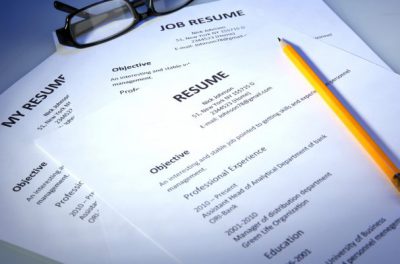
Ten Best Words to Put on a Résumé A while ago, I did a post on the ten words to avoid on your résumé. You can see it here. In that article, I mentioned how many of the “go-to” words people typically use are useless. I’m including a table I used in that post to show […]
Like this:
Like Loading...
Continue Reading

Rules You Shouldn’t Break When Writing a Résumé The easy answer to that statement is “all of them” but that wouldn’t be correct. As we saw in a previous post, there are a few rules you want to break. The majority of them, however, should be adhered to. So read on for a quick rundown […]
Like this:
Like Loading...
Continue Reading

Every résumé needs a cover letter. Cover letters are your chance to shine (or look like an ass). The following is an excerpt from my book No Mistakes Resumes. I know that most people don’t use cover letters. That should make you happy. Why? Because that gives you an edge. Using a cover letter is like […]
Like this:
Like Loading...
Continue Reading

I know I already wrote about mistakes to avoid on cover letters, but that didn’t encompass all the common mistakes. It’s time to look at a few more of the common errors. More Cover-Letter Mistakes A cover letter opens up wonderful opportunities, but it is also where mistakes appear most often. In a cover letter, […]
Like this:
Like Loading...
Continue Reading
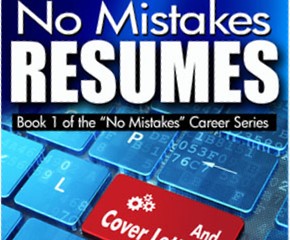
I’ve mentioned time and again about making no mistakes on your résumé, but there are certain grammar rules you should break when writing a résumé. Résumés have their own set of rules, and they should be adhered to if you want your résumé read. Rule Number One Don’t Include the Articles “The”, “A”, or “An” […]
Like this:
Like Loading...
Continue Reading

When to Use Compound Modifiers on Résumés Compound modifiers play an important part in the English language, particularly when written. Many people pay no attention to them, but it’s important to know when to use compound modifiers—especially on résumés—because some of the people who screen résumés do pay attention. And of all the places where […]
Like this:
Like Loading...
Continue Reading

Numbers On Résumés Before we get started, I’m going to briefly discuss numbers and numerals. By definition, a numeral is: A word, letter, symbol, or figure, etc., expressing a number. There are rules regarding when to use the word numeral versus number. I’m going to ignore those rules and use number/s for everything. Now back to the looking […]
Like this:
Like Loading...
Continue Reading

Words That People Misuse Have you ever heard someone say “ain’tâ€, and thought—they should improve their grammar? Most of us have probably thought that at some point. But perhaps we shouldn’t judge too harshly, because there are many words that are misused on a daily basis. They might not seem as bad as ain’t, but some […]
Like this:
Like Loading...
Continue Reading

List of Business Redundancies Everyday speech, television, movies, books, emails, and all other forms of communication are riddled with redundancies. Most of it is harmless, of no consequence, but if you want to present yourself in the best light, try learning a few of the more common business redundancies. These appear frequently on resumes, […]
Like this:
Like Loading...
Continue Reading
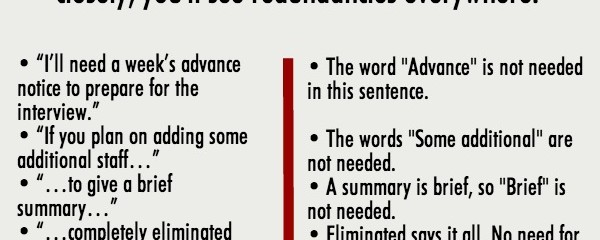
Redundancies If you enjoyed this, please share. And don’t forget to check out my other Infographics here. by
Like this:
Like Loading...
Continue Reading

Clarifying What We Mean—When Is Midnight? During one of my book promotions, the people running the ad sent me this message: Hi Giacomo, I will be posting your book, Murder Has Consequences, as a bargain book on Wednesday, 7/17. Please leave your book on sale until midnight 7/18. Thanks, Administrator I thought to myself, but when […]
Like this:
Like Loading...
Continue Reading

I Feel Good When I ask people “How are you?”, I typically receive a response of “I’m well, thank you.” But is that the right response? Should you say good or well? This is a particularly sensitive issue, because in almost every interview situation candidates are asked something similar to “How are you?” And you’ll probably […]
Like this:
Like Loading...
Continue Reading
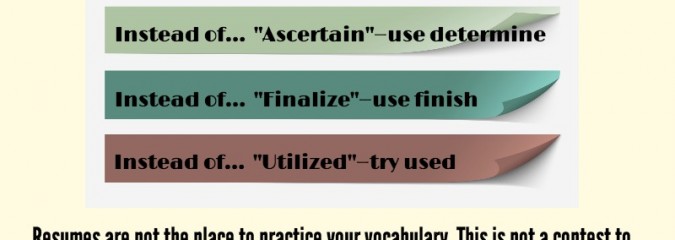
Two-Dollar Words If you want to see the full text of this article, click here. You can download the pdf by clicking the button below. You’ll have to sign up as a subscriber, but once you do, all the info graphics are free, as well as other files. Two-Dollar Words – download pdf […]
Like this:
Like Loading...
Continue Reading
We Are Semicolons; Don’t Be Afraid Most people either don’t use a semicolon because they aren’t sure of the rules, or, they use them improperly. They aren’t difficult to master, at least not for the basics. If you learn these three rules, you’ll have enough knowledge to cover almost all instances. I wrote a post about semicolons […]
Like this:
Like Loading...
Continue Reading

10 Words to Avoid on Resumes Do you struggle deciding which words to use on your resume? Many people do, which prompted me to write this article. I did another post on impact words for resumes, and also one about how powerful words can be in all of your writing. Today, we’ll explore the opposite […]
Like this:
Like Loading...
Continue Reading

Power Words For Resumes Words can be very powerful. And since your resume is—by necessity—limited to a page or two, it is important that the words you use have impact. Resumes consist of incomplete sentences and bullet points; you can’t afford to use weak or passive verbs. I compiled this list from many sources, including […]
Like this:
Like Loading...
Continue Reading

What Is an Em Dash and How Do I Use It Hyphens, en Dashes, Em Dashes In order to understand an em dash, it’s important to put it into perspective. That means we need to explore a few details on hyphens and en dashes. The following are definitions from CMOS (Chicago Manual of Style). Hyphen […]
Like this:
Like Loading...
Continue Reading

A lot of writing, whether or not it’s books or, especially formal business writing, has become excessively bloated, quite pretentious, and very confusing. It has been heavily bogged down with redundancies, and it seems to be quickly getting much worse. Whoa! I hope you made it this far, because if it had been me reading […]
Like this:
Like Loading...
Continue Reading

Two-Dollar Words Many people think that the bigger the word you use the better it sounds. They seem to equate the number of syllables, or scarcity of word usage to sounding scholarly. What these people don’t understand is that the trick is not to find the biggest word, but the word that works best in […]
Like this:
Like Loading...
Continue Reading























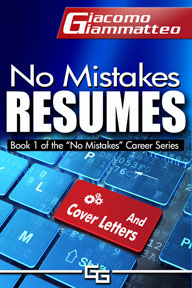





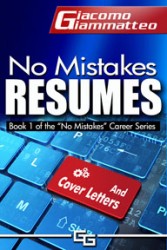

Connect
Connect with us on the following social media platforms.